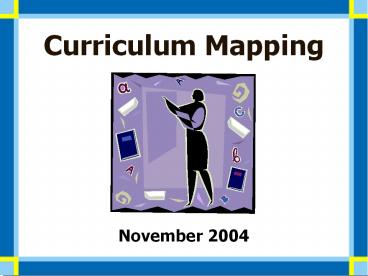Curriculum Mapping - PowerPoint PPT Presentation
Title:
Curriculum Mapping
Description:
Recommended Standards as defined by experts in their field. ... Supported Curriculum for which materials are actually available, such as ... – PowerPoint PPT presentation
Number of Views:1291
Avg rating:3.0/5.0
Title: Curriculum Mapping
1
Curriculum Mapping
- November 2004
2
Todays Agenda
- Pre-Survey
- Introduction of CM Team
- Purpose
- What is Curriculum?
- Why Map?
- CM Concepts
- Tentative Timeline
- Post-Survey
3
Curriculum Mapping Team
- Katie Byrne
- Kim Campagna
- Nellie Delfini
- Bryan Drozd
- David Dudiak
- Hope Durkin
- Madonna Fiorelli
- Sharon McGuire
- Ceil Oakes
- Susan Scroppo
4
Purpose
- No decisions have been made as of yet.
- This meeting is designed to provide information.
5
Define Curriculum
- Activity
6
Types of Curriculum
- Recommended Standards as defined by experts in
their field. - Written State standards, local goals and
objectives (ie., curriculum binders). - Supported Curriculum for which materials are
actually available, such as textbooks and
software.
7
Types of Curriculum
- Tested What is actually assessed at the state
and local level. - Taught The content that teachers actually
deliver. - Learned The content that students learn.
8
What is Curriculum Mapping?
Curriculum Mapping is the documentation and
discussion of what we teach.
It is a collaborative process that helps us unde
rstand teaching and learning throughout the
Elementary and Middle School .
9
Why Curriculum Mapping?
- It benefits ALL students.
- Mapping is a COMMUNICATION tool.
- Mapping is a PLANNING tool, it keeps us FOCUSED
and targets necessary information. - Promotes PROFESSIONALISM and teaching
creativeness.
10
Benefits
- Mapping is not burdensome, in fact it replaces
repeat teachings and (eventually) lesson plans. - Mapping allows us to focus on fewer goals, and
therefore, teach concepts in depth. - Mapping will eliminate wasted review and expand
teaching time. - It vertically shows curriculum steps.
11
What Happens With Curriculum Mapping?
- Departments can investigate the map to identify
gaps in the vertical and horizontal alignment of
courses. - Assess what students mastered in the preceding
grade and focus on building skills and knowledge.
- Horizontal alignment, assures that all teachers
follow a similar timeline.
12
Curriculum MappingAttempts to
- Create a snapshot of the educational activities
of every classroom within the district. - Capture the content skills and assessments taught
by every teacher in the district.
- Organize this information into an easily accessed
visual that presents a timeline of instruction by
teacher and course.
13
Every day
When
This is a multi-year ongoing process
14
Well show you.
How
15
Sample Curriculum Map
16
Essential Questions
- Focus on a broad topic of study.
- Have multiple answers and perspectives. They
address why or how. - They are mental Velcro that helps ideas stick
in students minds.
17
Essential QuestionsExamples
- Which is more important water or air?
- What is change?
- What if Shakespeare were a woman?
18
Content
- Content is the essential concepts and topics
covered during a month. - Content is written beginning with a noun.
19
ContentExamples
- Cultural diversity
- Water cycle
- Bridge to Terabithia
- Local Government Systems
- Fire Safety
20
Skills
- Skills are key abilities and processes students
will develop related to specific content. - Skills are written beginning with a verb.
21
Skills Examples
- Reading a map
- Writing a play
- Analyzing non-fiction text
- Writing persuasive essays
- Matching words and pictures
22
Assessment
- Assessments are the products or performances that
demonstrate student learning. - Assessments are what the student does (the actual
product or performance), not the evaluation tool
used to assess the product.
23
Assessment Examples
- Group presentation
- Brochure
- Research Paper
- Essay exam
- Puppet show
- Debate
24
Activities
- Key activities that lead to acquisition of
knowledge and skills. - Describe the "how" for the knowledge and skills.
25
Activities Examples
- Writing persuasive letters to local government
- Water analysis of local river
- Critique a work of art
- Create a 50 states quilt
26
Curriculum Mapping Timeline
- Summer 2004 Core team attends training
- Fall 2004 Core Team plans training and
dissemination. Presents at Institute. - December 2004 Staff Development
- January 2005 CM Training continues during
Institute
27
Curriculum Mapping Timeline
- February 2005 Train teachers and staff.
Teachers and staff develop maps for one class or
content area - February 2005 Identify and purchase software
- March 2005 Teams review maps.
28
Curriculum Mapping Timeline
- Academic Year 2005/2006 First draft of
Curriculum Maps are finished. - Review and revision of maps begin
- And then
29
Once we have our Maps, what do we do with them?
30
Maps are never finished they are a work in
progress!
31
Post-Survey
32
(No Transcript)































